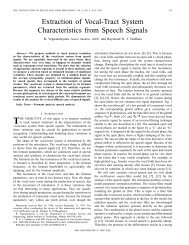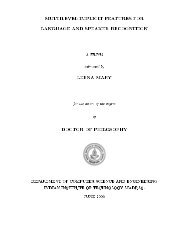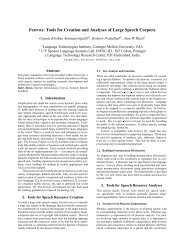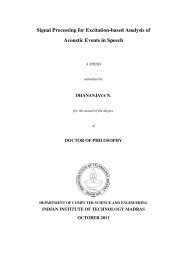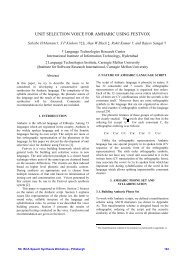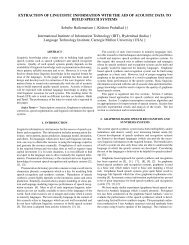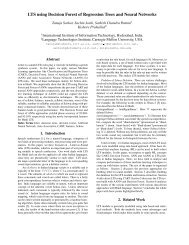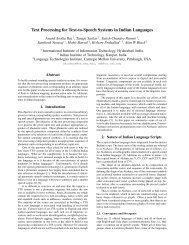word boundary- hypothesisation in hindi speech - Speech and ...
word boundary- hypothesisation in hindi speech - Speech and ...
word boundary- hypothesisation in hindi speech - Speech and ...
You also want an ePaper? Increase the reach of your titles
YUMPU automatically turns print PDFs into web optimized ePapers that Google loves.
The follow<strong>in</strong>g issues are addressed <strong>in</strong> this thesis:<br />
1. Effect of <strong>word</strong><strong>boundary</strong> <strong>hypothesisation</strong> on lexical analysis,<br />
2. Identification of language clues for <strong>word</strong> <strong>boundary</strong> <strong>hypothesisation</strong>,<br />
3. Identification of lexical clues for <strong>word</strong> <strong>boundary</strong> <strong>hypothesisation</strong>,<br />
4. Identification of prosodic clues for <strong>word</strong> <strong>boundary</strong> <strong>hypothesisation</strong>, <strong>and</strong>,<br />
5. Identification of acoustic-phonetic clues for <strong>word</strong> <strong>boundary</strong> <strong>hypothesisation</strong>,<br />
1.3 Studies on <strong>word</strong> <strong>boundary</strong> <strong>hypothesisation</strong> for H<strong>in</strong>di<br />
The first study <strong>in</strong> our work is on the effect of <strong>word</strong> boundaries on lexical<br />
analysis. Experiments were carried out to compare the time spent on lexical match<strong>in</strong>g<br />
for the two cases of <strong>word</strong> boundaries known <strong>and</strong> unknown. The results proved<br />
conclusively that the presence of <strong>word</strong> boundaries <strong>in</strong> the <strong>in</strong>put sentences can reduce<br />
the time spent on lexical analysis significantly. For example, lexical analysis time for<br />
the sentence pa.-/Lsa.-la- me. erk mi- bplJd. ne.- pwc? l&a.- hai was reduced by a factor<br />
of 1000 when the <strong>word</strong> boundaries were known, compared to the case when the <strong>word</strong><br />
boundaries were unknown, when the sentence had 10% errors <strong>in</strong> phonemes.<br />
Studies were also carried out to estimate the <strong>in</strong>crease <strong>in</strong> the number of sentence<br />
alternatives for the <strong>in</strong>put sentences. The studies showed that the presence of <strong>word</strong><br />
boundaries, reduced the number of alternate <strong>word</strong> str<strong>in</strong>gs match<strong>in</strong>g the <strong>in</strong>put sentence.<br />
For example, for the sentence, pa.-ih~a=ln. me: e:k nni. Za+aki: ne:prave:s 1iya.- hoi<br />
produced nearly twice the number of alternate <strong>word</strong> str<strong>in</strong>gs when the <strong>word</strong> boundaries<br />
were unknown, compared to the case when the <strong>word</strong> boundaries were known, at an<br />
<strong>in</strong>put error rate of 10%. Thus the results of the study established that <strong>word</strong> <strong>boundary</strong><br />
<strong>hypothesisation</strong> improves the performance of the lexical analyser significantly.<br />
The next study relates to the identification of language clues for <strong>word</strong> <strong>boundary</strong><br />
<strong>hypothesisation</strong>. The language clues proposed correspond to the frequently occurr<strong>in</strong>g



